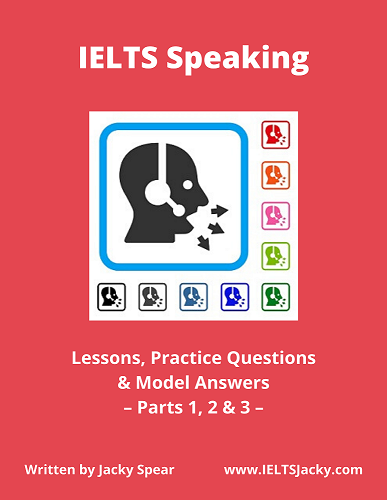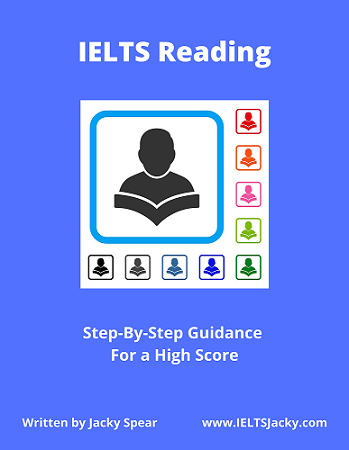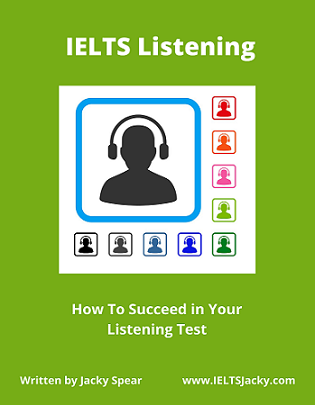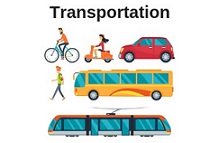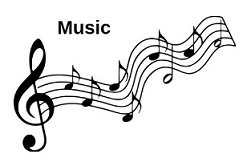IELTS
Speaking Exam - More Part 2 Tips
– How To Begin Your Part 2 Talk –
For many people, the hardest section of the IELTS Speaking exam is Part 2 because you have to talk continuously for 2 minutes.
Most probably, you rarely do that in your own language, let alone in a foreign language. Don’t worry, it’s actually not that difficult. You need just two things:
- Knowledge of how to quickly plan your talk
- Lots of practise
It doesn’t matter what subject you get in Part 2 of the IELTS Speaking exam as long as you know how to effectively create an outline for your talk in the 1 minute planning time you're allowed before you have to start speaking. With this knowledge, you’ll be able to deliver a short monologue on any topic.
We’ve already looked at my top 3 strategies for developing Part 2 talks. If you’ve not already seen them, you’ll find them here.
Part 2 Planning Strategies:
Method 1 – ‘question prompt’ + planning notes & sample answers.
Method 2 – ‘brainstorming’ + planning notes & sample answers.
Method 3 – ‘the 5 senses’ planning notes & sample answers.
Please make good use of them and practise as much as you can.
On this page, I'm going to help you with a specific issue that many students struggle with, that is, how to begin your talk.
 We chat to friends all the time but we rarely talk for 2 minutes at a time. It needs practise.
We chat to friends all the time but we rarely talk for 2 minutes at a time. It needs practise.
How To Begin Your Part 2 Talk
I’ve said many times on this website that you should never try to memorise answers for the IELTS Speaking exam. However, it is a good idea to create and practise a few opening phrases that can be adapted for use with a wide range of topics. Use one of these in your first sentence to introduce your talk.
Here are some ideas for phrases that are easy to learn and include in an opening sentence.
7 Adaptable Phrases
1) the one I’d like to tell you about is…
2) my favourite was…
3) I’d like to talk about...
4) Let me tell you about…
5) Personally, I would have to say…
6) the one who/that stands out is…
7) I’m going to tell you about...
Want to watch & listen?
Click
on this video.
Now for some examples of how to use them in your IELTS Speaking exam.
1) Describe something you do to stay healthy.
I do many things that contribute to a healthy lifestyle but the one I’d like to tell you about is…
2) Describe a TV programme you have watched recently.
I have watched several good TV programmes recently but my favourite was…
3) Describe a day out that you enjoyed.
I’d like to talk about the time I went to…
4) Describe a special friend.
Let me tell you about my friend Kia.
5) Discuss the meaning of happiness for you.
Personally, I would have to say that being happy...
6) Describe the best teacher you have ever had.
I’ve been lucky enough to have had several really good teachers but the one who stands out is…
7) Describe a photograph you particularly like.
I’m going to tell you about a photograph I took...
For some of these introductions, you could follow the first sentence with a phrase such as,
I’ve chosen this… because…
For example:
Describe a place that is special to you.
I’d like to tell you about a field not far from where I live. I’ve chosen this place because it’s where I love to walk my dog.
Now you have a two sentence opening and have set yourself up nicely for the main part of your talk.
 I'd like to talk about the time I went to the beach with my friends.
I'd like to talk about the time I went to the beach with my friends.
Top Tips For Extra Marks in Your IELTS Speaking Exam
Using any of these opening sentences will get you off to a great start with Part 2 of your IELTS Speaking exam. However, there are a few simple things that can be done to our opening sentences to increase our score.
Improving Your Opening Sentence
I’ve chosen one of our topics and opening sentences to work with but any of the examples could be improved in similar ways.
Topic: Describe a TV programme you have watched recently.
Opening sentence: I have watched several good TV programmes recently but my favourite was…
There’s nothing wrong with this sentence but we can easily make it better.
Many students repeat the words on the cue card, as I did in the example. I’ve underlined them. They are ‘watched’ and ‘recently’.
In order to get a Band 6 and above, you will need to paraphrase the topic sentence and show that you are able to use your own language. Like this,
I have watched seen several good TV programmes recently in the past few weeks but my favourite was…
I’ve simply changed a couple of the key words to show the examiner that I am able to say something in more than one way. This will gain me marks.
You could also name a particular type of TV programme instead of repeating ‘TV programmes’. For example,
I have seen several good documentaries / comedies / dramas in the past few weeks...
There’s something else we can do with the vocabulary to impress them even more.
In the original sentence, I use the phrase ‘good TV programmes’. ‘Good’ is a very ordinary word and would be better replaced with a stronger adjective, such as,
I have seen several good excellent TV programmes in the past few weeks...
Now let’s see what adjectives would work with our different types of TV programmes.
I have seen several thought-provoking documentaries...
I have seen several extremely funny comedies...
I have seen several exciting dramas...
Finally, don’t forget to use contractions. Instead of ‘I have seen...’ contract to ‘I’ve’. If you do, you will get a better score for your pronunciation.
So let’s conclude by looking at the opening sentence we began with and an improved version.
1) I have watched several good TV programmes recently but my favourite was…
2) I’ve seen several extremely funny comedies in the past few weeks but my favourite was…
The second version is a much stronger sentence and would make an excellent opening to a talk on this topic.
 I've seen several thought-provoking documentaries in the past few weeks.
I've seen several thought-provoking documentaries in the past few weeks.If you’re aiming for a Band 6.5 and above in your IELTS Speaking exam, these are the sorts of things you need to be able to do with language. The more you practise, the better you will get.
It is little things like this that will gain you the marks needed to get a high band score. Just think about the language you’re using and show the examiner how flexibly you can use it.
Once you’ve got the introduction out of the way, you are straight into the main part of your talk. Don’t forget to read the pages I suggested above to help you plan the rest of your Part 2 talk.
More Help With Your IELTS Speaking Exam
IELTS Speaking Test – Know the format & understand what you’ll be assessed on. Discover the main reason for low scores & how to avoid this big mistake.
IELTS Speaking Part 1 – 7 simple methods for developing your answers, with examples.
IELTS Speaking Part 2 – Test format, understanding cue cards & 5 test mistakes to avoid.
IELTS
Speaking Part 3 – 6 common types of questions & how to
answer them.
IELTS Speaking Topics – Discover 40+ common subject areas for the IELTS Speaking exam.
IELTS Speaking Practice – Massively improve your speaking skills by learning how to think in English.
IELTS Speaking Questions – Download 30 mock tests (30 practise cards on 30 topics – 330 questions).
IELTS Speaking Tips – 9 top tips for a high score in your IELTS Speaking exam.



